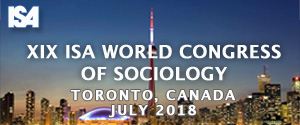New Cultural Frontiers – Call for Papers 5th issue
11th Dec 2012 | By Emanuele | Category: News & Events“Actors and Movements around Technology, Risks and Environment”
Deadline: April 30th, 2013
You can download the call for papers here.
After a series of major events such as natural disasters, nuclear accidents and huge environmental incidents, various actors – individuals and groups – who performed significant activities concerning these events (but who had also remained unnoticed at the same time) suddenly gained attention and were given voice. Put in other words, people previously had perceived things as a unity of regime, structure, systemand domination that were being reproduced automatically. However, the emergence of subsequent cracks due to matters, that have by now become self-evident, made the intentions and relationships of these actors visible. As a result,society is now being regarded as something that is generated through the various activities and the complex relationship of different kinds of actors.
For instance, following the Great East Japan Earthquake and Tsunami of March 11th, various kinds of actors and specific actions have become visible, including several large-scale de-nuclearization and anti-radioactive contamination demonstrations; the Tokyo Electric Power Co. (TEPCO); the Nuclear and Industrial Safety Agency (NISA); government officials, ministries and agencies; stockholders, Industry Worker’s Unions; evacuees from Fukushima; the mass media and alternative media; municipal chiefs, residents, aid activities and volunteers; ‘intellectuals’ muttering on twitter; de-nuclearization movements; NPOs and corporations involved in natural energy.
A similar process took place after the Threemile Island Nuclear incident in the USA too, just like after the Chelnobyl disaster in Europe. The consequences of this kind of disasters, along with the subsequent reflection on de-nuclearization, impacted remarkably in other countries too. Among others, Germany – for instance – declared to end its nuclear energy industry in twenty years from now and this phenomenon may even expand all around the world.
However, interestingly enough, actors and actions are going to be difficult to be spotted again, and thus it will become uneasy to realize that the world is being formed through actions by various kinds of actors. This is because if there is a rapid increase in the number of people with a feeling of powerlessness, saying that ‘even if an incident or accident takes place, nothing would change’, or questioning ‘whether this was a really important incident in the first place’, this may lead to the obscurity of actors. ‘Forgetting’ things that are seen as a problem right after the disasters might pertain to the process whereby events come to be positioned within the flow of systems, which then results in the fading-away ofreality and actuality in the form of things that are generated through actions.
If we wish to avoid this unfortunate outcome, we should attempt to learn more about the dynamic relationships between actors as well as the complicated realities, subjectivities and experiences of various kinds of actors, instead of just focusing on one aspect such as a certain function in a system, a certain agency in class struggles or rationality in political processes.
Given the problems outlined above, the current issue focuses on risks, technology including nuclear energy and environment in relation to huge incidents or accidents. Accordingly, in the current issue we welcome submissions that address the following topics:
– protests against all kind of technology
– environmental movements surrounding technology
– movements for the victims of disasters and accidents
– subjectivity, social experiences of actors, victims and refugees.
– de-/anti-nuclear movements: nuclear power conflicts
– pro-nuclear political parties, pressure groups, unions, corporations
– alternative energy movements and NPOs for natural-energy
Theoretical approach is welcome. Comparative and interdisciplinary approaches are particularly welcome.
How to submit?
In order to submit a paper, please first get registered on the New Cultural Frontiers website at the following address: www.newculturalfrontiers.org. New Cultural Frontiers is a peer-reviewed on-line journal that publishes submissions by doctoral students and junior faculty members. Supported by the International Sociology Association, the scientific board of the New Cultural Frontiers includes well-known social science scholars from around the globe. Papers may be written in English, French or Spanish.
Before submitting papers, please have them reviewed by a native-language speaker to ensure that they meet standards for academic publication.
Editors:
Eiji HAMANISHI (chief) hamanishi@post.ndsu.ac.jp
Zsombor RAJKAI rajkai72@fc.ritsumei.ac.jp

